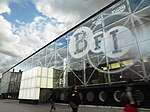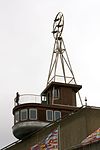Museum of the Moving Image (London)
1988 establishments in England1999 disestablishments in EnglandBritish Film InstituteCinema museums in LondonDefunct museums in London ... and 6 more
Former buildings and structures in the London Borough of LambethMass media museums in the United KingdomMuseums disestablished in 1999Museums established in 1988Museums on the River ThamesUse British English from August 2015

The Museum of the Moving Image (MOMI) was a museum of the history of cinema technology and media sited below Waterloo Bridge in London. It was opened on 15 September 1988 by Prince Charles. The museum formed part of the cultural complex on the South Bank of the River Thames. MOMI was mainly funded by private subscription and operated by the British Film Institute. MOMI was closed in 1999, initially on a supposedly temporary basis, and with the intention of its being relocated to Jubilee Gardens nearby. Its permanent closure was announced in 2002.
Excerpt from the Wikipedia article Museum of the Moving Image (London) (License: CC BY-SA 3.0, Authors, Images).Museum of the Moving Image (London)
Charlie Chaplin Walk, London Lambeth (London Borough of Lambeth)
Geographical coordinates (GPS) Address Nearby Places Show on map
Geographical coordinates (GPS)
| Latitude | Longitude |
|---|---|
| N 51.506666666667 ° | E -0.115 ° |
Address
BFI Southbank
Charlie Chaplin Walk 1
SE1 8XR London, Lambeth (London Borough of Lambeth)
England, United Kingdom
Open on Google Maps









